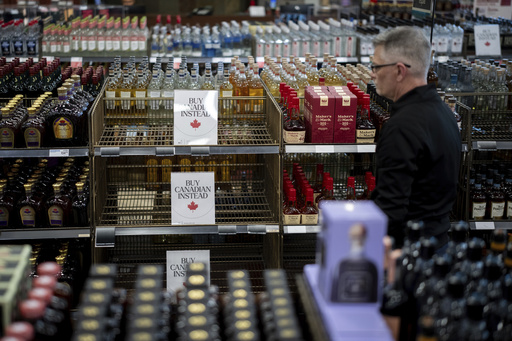TORONTO — In a significant development, both Canada and Mexico have responded to the hefty tariffs imposed by President Donald Trump by implementing retaliatory tariffs on American products, raising questions among businesses and consumers in these countries regarding the potential repercussions of this new trade conflict.
Initially, Canada has announced a 25% tariff on a range of American imports effective Tuesday, impacting beverages, cosmetics, and paper items with an estimated combined value of 30 billion Canadian dollars (around $20 billion). Furthermore, a subsequent list of targeted products is expected to follow, which may include passenger cars, trucks, steel and aluminum, specific fruits and vegetables, beef, pork, dairy, aerospace components, among others, that could be valued at an impressive 125 billion Canadian dollars (approximately $85 billion).
Trump expressed his stance on the situation, stating that he intends to have discussions with leaders from Canada and Mexico on Monday. Meanwhile, Mexico has yet to divulge specific details regarding the rate or the items that will be affected by its retaliatory tariffs.
Following the U.S. government’s announcement of the new tariffs — specifically a 25% tax on goods from Canada and Mexico, as well as a 10% tax on Canadian oil and imports from China — Canadian Prime Minister Justin Trudeau and Mexican President Claudia Sheinbaum engaged in a phone conversation. According to a statement from Trudeau’s office, both leaders agreed on the importance of reinforcing “the strong bilateral relations” existing between their nations. However, a senior Canadian official noted that the responses regarding tariffs were not necessarily collaborative.
“Now is the moment to support Canadian-made products,” Trudeau shared on social media, encouraging citizens to check labels and prioritize local choices. With Canada being the leading export destination for 36 states and Mexico holding the title as the largest trading partner of the U.S., the stakes are high.
Despite Trump’s warnings of increased duties if retaliatory tariffs are enacting on U.S. goods, both nations have pressed forward. “We are not seeking escalation, but we will defend Canada,” Trudeau asserted late Saturday. In an unusual move, officials from provinces such as Ontario, British Columbia, Quebec, Manitoba, and Nova Scotia are considering removing American liquor brands from government-operated stores. Ontario’s Liquor Control Board, which typically sells nearly $1 billion worth of American beverages annually, is set to prohibit American products beginning Tuesday.
On social media platforms, users have been actively discussing alternatives to American goods amidst these ongoing tariffs. Trudeau has also directly addressed the impact of these tariffs on Americans, highlighting the genuine consequences they will face. In his response, Trump criticized Canada’s trade surplus with the U.S., suggesting that without it, Canada would struggle to remain a viable nation and proposed that Canada could benefit as the “51st state,” emphasizing lower taxes and improved military protection.
The sentiment among Canadians is one of discontent; Trudeau remarked on the contributions made by Canadian troops alongside Americans in various conflicts, as well as in responding to major disasters such as California’s wildfires and Hurricane Katrina. This tension was evident at several sporting events where Canadian hockey fans booed the American national anthem, and similar actions occurred during an NBA match in Toronto between the Raptors and Los Angeles Clippers, where one fan decided to sit in silence while showcasing a Canadian hat.
In Mexico, the government has issued limited public comments about the tariff threats, simply stating preparations are in place to uphold national respect. Previously, in 2019, Mexico managed to avoid Trump’s tariffs through immigration policy adjustments, but the current climate, marked by accusations against the Sheinbaum administration concerning ties with criminal organizations, has compelled a more assertive response.
Sheinbaum has urged the U.S. to address its own internal issues with drugs and firearms, while Trump claimed the tariffs are intended to halt the illegal immigration and drug trafficking concerns affecting both borders. On the streets of Mexico, citizens are processing the implications of this decision; a local salesperson expressed confidence in their government’s handling of the situation, suggesting that past hardships, such as the pandemic, have prepared them to withstand further challenges.
However, concerns linger in border regions like Mexicali, where residents worry about the broader effects of a potential trade conflict. Alejandro Acosta, a driver who frequently delivers produce to U.S. clients, expressed apprehension that increased taxes might force American companies to relocate operations back to the U.S., ultimately leading to a decline in jobs in Mexico.
This trade war emerges against the backdrop of Canada entering an election cycle, with Trudeau’s Liberal Party set to announce a new leader on March 9, followed by a probable election in spring. Mark Carney, a prominent figure likely to succeed Trudeau, emphasized that “Canada will not bow down to a bully.”



